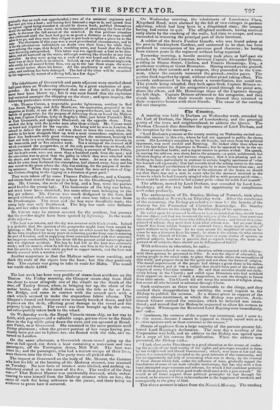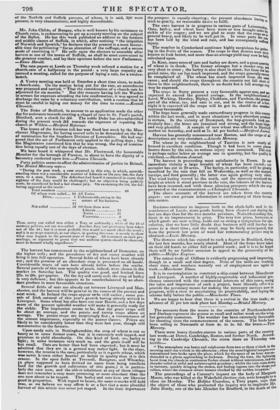rbt Countrn.
A meeting teas held in Durham on Wednesday week, attended by the Earl of Durham, the Marquis of Londonderry, and the principal gentry of the town and neighbourhood, to address the Queen. The Durham Chronicle thus describes the appearance of Lord Durham, and his reception by the meeting- " Lord Durham's presence at the county meeting on Wednesday excited con- siderable interest in this city, where he had not appeared in public for eleven years. Ibis Lordship's reception by his old friends, and even from his political opponents, was most cordial and flattering. Ile looked older than when we saw him last before his departure to Russia; but he appeased to be in the en- joyment of excellent health, and a degree stouter in person withal. His speech, in moving the address, was short, but to the purpose,—a quiet, unlaboured, but effective display of manly and nervous eloquence, that it Was pleasing and re- freshing to hear, particularly in contrast to certain lengthy specimens of what the kat ned call rigmarole,' that had recently tired the twining senses in the same place. It excited recollections of times gone by in more breasts than one ; and if the language of the eye be an index to the emotions of the heart, we should say that there was not a man in court who for the moment reverted to the scenes in which he had formerly mingled who slid so with greater satisfsetion- there could be none entitled to feel a juster pride—than the noble Earl himself.'
The address, moved by Lord Durham, was seconded by Lord Lon- donderry; and the two lords took the opportunity to compliment each other profusely.
The enthronement of Dr. Stanley, Bishop of Norwich, took place in the cathedral at Norwich, on Thursday week. After the conclusion of the ceremony, the Bishop preached a sermon tid. the benefit of the Society for the Promotion of Christian Knowledge. Dr. Stanley gave deep offence to his clergy by the liberality of his opinions— Ile called upon his reverend brethren to bear in mind that they should have but one object, and that was to extend the religion of time Cuss; they must cast the mantle of charity over those who ilitfimed from them ; and before they com- plained of schism, they must first learn what schism was. Let 110 man think, himself flee from schism because of outward form ; there might he unity of spirit without unity of form : let no man accuse neighbour of schism be- cause he was a dissenter from his creed ; he alone is the schism .tie who creates feuds in the church of Christ. if there were so many shades of opinion on political subjects, how was it possible that as regards religion, the most im- portant of all subjects, there should not be differences of belief?
With reference to education, he said— Some persons refused to sanction education unless connected with religion with those persons he presumed to differ. It was the object of education, by raising people in the moral scale, to place their minds above the sensualities of this world, and prepare them for the spirit and not alone the forms of religion. The moral improvement of the people had always a great share in his endea- vours and desires, and it was a subject that should form part of the duty and objects of every Christian minister. He said that societies should not exclu- sively belong to the Church ; and called upon Dissenters who had withheld their support on account of such a supposition, to cast the thought in future from their minds. The Church did not mean the miuisters of religion alone, but meant all who believed in salvation through Christ.
Such sentiments as these were intolerable to the clergy, and they marked their disapprobation by omitting the usual request to the Bishop to publish his sermon. At a dinner given in support of the society above-mentioned, at which the Bishop was present, Arch- deacon Glover noticed the omission, which be believed was inten- tional ; and moved that the Bishop be requested to allow his sermon to be printed. Whereupon the Reverend Lord Bayning rose immediately, and -aid- '. Gentlemen, the omission of the request was intentional, and I avow it; fur this reason—because I cannot be supposed to identify myself with or to st;ietion opinions such as those contained in the sermon."
Shouts of applause from a large majority of the parsons present fol- lowed Lord Bayning's declaration. The next day a meeting of the Corporation was held, and an address to the Bishop was agreed upon for a copy of his sermon for publication. When the address was presented, the Bishop said-- " I look alone under Providence to a good education as the means of render- ing the proide of our land worthy of the tights and privileges awarded to them by our enlightened and liberal Government ; which, ever since it has had the power, has unremittingly attended to the great interests of the community, and lost nu opportunity nut only of renovating what was in decay, by the removal of those abuses which had, under the influence of time, gradually sapped the foundations of some of our most valuable institutions, but has also with a firm hand attempted improvements and reforms, for which I feel confident posterity will do them justice, and their good works shall meet with a just reward." He would at all times support those political principles lie had through life avowed, as he conceived them to be conducive to the happiness of mankind, and consequently to the glory of God.
The above account is taken from theNorwichlIfercury. The conduct of the Norfolk and Suffolk parsons, of whom, it is said, :3tx) were present, is very characteristic, and highly discreditable.



























 Previous page
Previous page